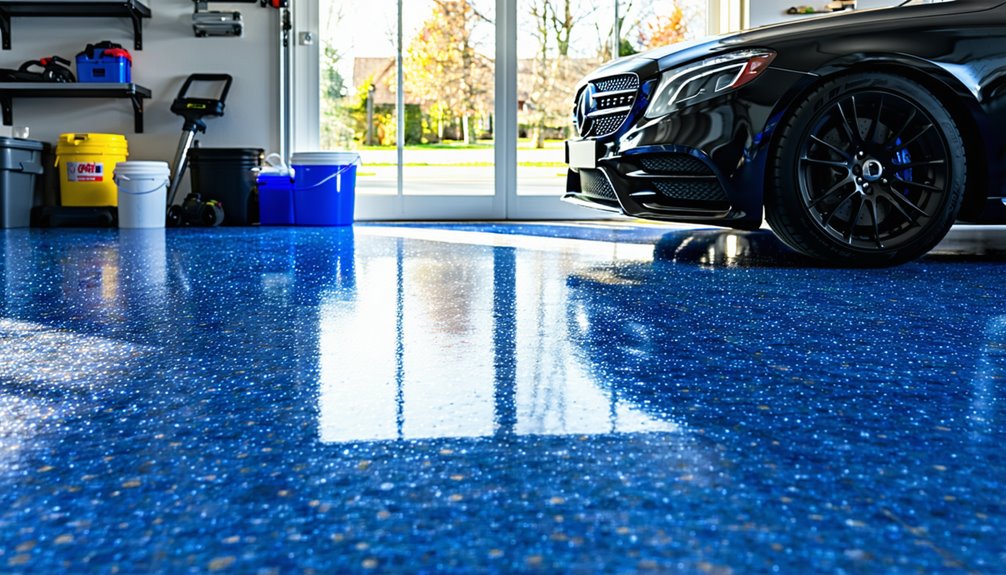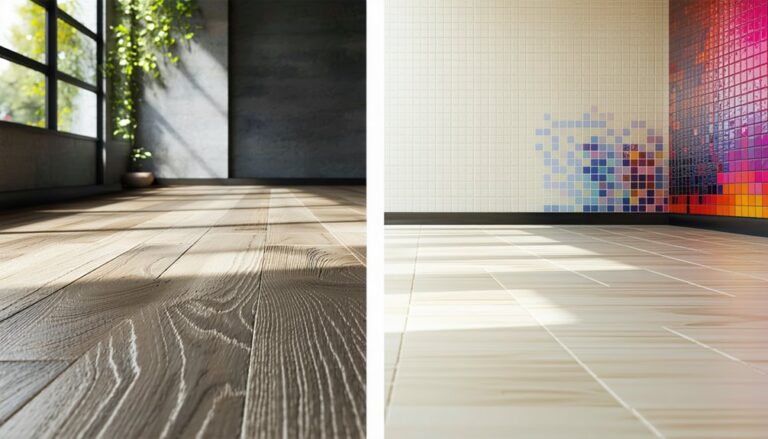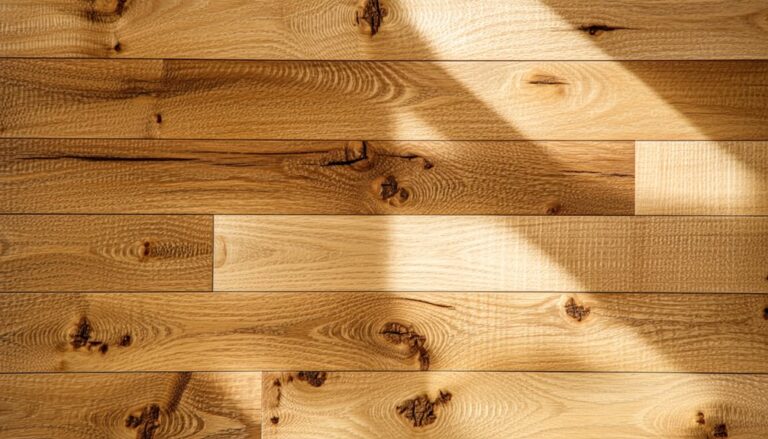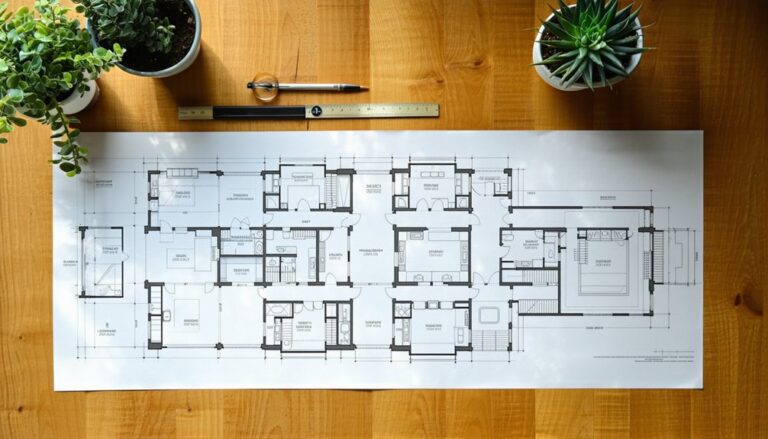To epoxy your garage floor, expect to pay between $2 to $5 per square foot for professional installation. The total cost varies based on your garage's size, the condition of the floor, and any additional finishes or colors you choose. If you opt for DIY, materials can range from $100 to $500, plus tool costs of about $50 to $200. Remember, preparing the surface properly plays a big role in the success of the project. Investing in quality materials now can save you money in the long run. There's more to evaluate, so keep exploring your options for a beautiful garage floor.
Overview of Epoxy Coating Costs
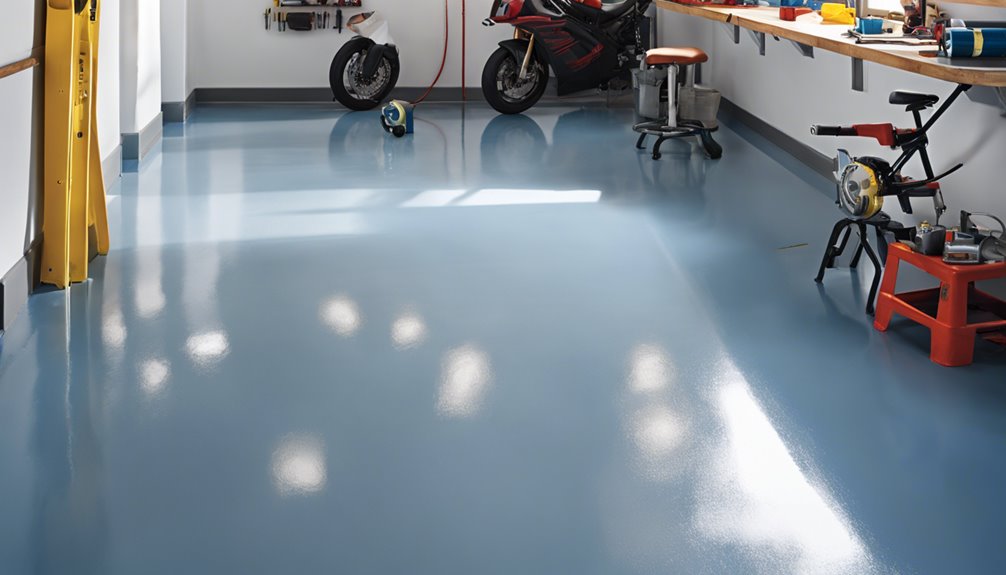
When considering an epoxy coating for your garage floor, understanding the costs involved is vital. Epoxy types vary widely, from basic one-part formulas to more durable, multi-layer systems. The type you choose directly impacts the cost, with premium options often providing better longevity and performance. Installation methods also play a significant role; DIY applications are generally cheaper but require time and effort, while professional installations can raise the price considerably due to labor and expertise. You'll want to factor in your garage's size, the condition of your existing floor, and any prep work needed. Balancing these elements will help you determine a realistic budget for your epoxy coating project, ensuring you achieve the freedom of a stunning, functional space.
Factors Influencing Cost
When considering the cost to epoxy your garage floor, two main factors come into play: material quality and surface preparation needs. Higher-quality epoxy materials can considerably increase the overall price, but they often provide better durability and a longer lifespan. Additionally, if your floor requires extensive preparation, such as cleaning or repairing cracks, this will also add to the total expense.
Material Quality Impact
Although you might be tempted to choose the lowest-priced epoxy for your garage floor, the quality of the material can greatly impact both the initial cost and long-term performance. Investing in higher-quality epoxy guarantees better material durability, which means fewer repairs and replacements down the line. Plus, premium products often offer a wider range of color options, allowing you to customize your garage space to reflect your style.
Consider these factors when selecting epoxy:
- Durabilité: Higher-quality epoxies withstand wear and tear.
- Finish: Premium options provide a more attractive finish.
- Ease of application: Better materials often mean simpler installation.
- Long-term cost: Investing upfront can save you money over time.
Choose wisely to enjoy a functional, stylish garage floor.
Surface Preparation Needs
To achieve a successful epoxy garage floor, proper surface preparation is essential, as it directly influences both the cost and the final result. You'll need to focus on surface cleaning and moisture testing to guarantee a strong bond. Here's a quick look at factors affecting preparation costs:
| Preparation Type | Cost Range | Importance |
|---|---|---|
| Surface Cleaning | $0.50 – $2.00/sq ft | Essential for adhesion |
| Moisture Testing | $100 – $200 | Prevents bubbling |
| Additional Repairs | Varies | Guarantees longevity |
Material Expenses
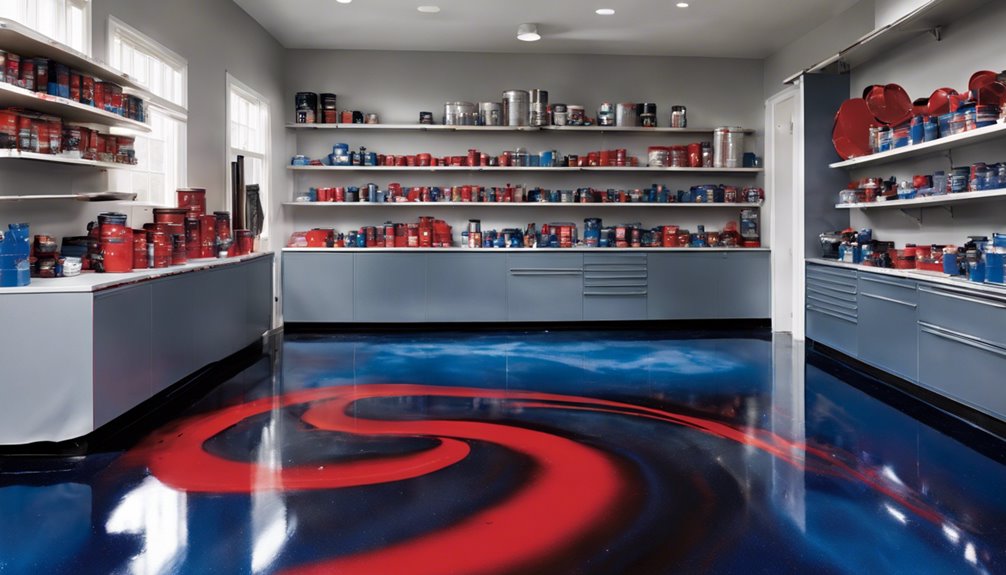
Epoxy sol requires a variety of materials, and understanding these costs can help you budget effectively. Different epoxy types and application methods can influence your overall expenses, so it's vital to know what you'll need. Here's a quick breakdown of essential materials:
- Epoxy resin: Prices vary based on quality and type.
- Hardener: Necessary for curing the epoxy properly.
- Apprêt: Guarantees better adhesion and durability.
- Color flakes or additives: Optional, but can enhance appearance.
Labor Costs
Once you've gathered the necessary materials for your epoxy flooring project, it's time to contemplate the labor costs involved. Hiring professionals will typically range from $2 to $5 per square foot, influenced by the labor market and the complexity of the installation techniques used. If you're opting for a more intricate design or additional coatings, expect higher rates. Factors like the size of your garage and local labor costs can also impact the final price. However, investing in skilled labor guarantees a polished finish and longevity for your floor. Weighing these costs against the time and effort you'd save is essential for making an informed decision that aligns with your freedom to choose how you want to approach your project.
DIY vs. Professional Installation
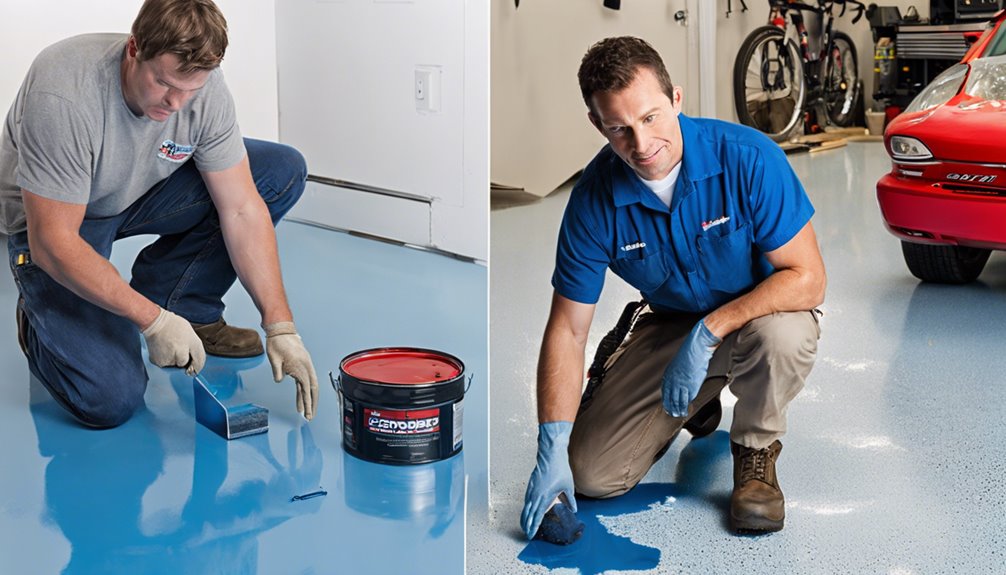
When deciding between DIY and professional installation for your epoxy garage floor, it's crucial to weigh the costs involved. You'll need to evaluate not just the price of materials, but also your skill level and how much time you can commit to the project. Understanding these factors will help you make an informed choice that suits your budget and capabilities.
Cost Comparison Analysis
Choosing between DIY and professional installation for epoxy garage flooring can considerably impact your budget. A thorough cost breakdown reveals that DIY might seem cheaper initially, but you'll need to factor in tools, materials, and your time. On the other hand, hiring professionals guarantees a flawless finish but comes at a higher price. Here's a quick comparison of your installation options:
- DIY Costs: Materials ($100-$500), Tools ($50-$200), Time Investment (several days)
- Professional Costs: Labor ($500-$2,000), Materials included, Warranty options
- Quality Assurance: Guaranteed results with professionals
- Flexibility: DIY allows you to choose your schedule
Ultimately, weigh the long-term benefits against upfront costs to make the best decision for your garage.
Skill Level Requirements
Successful epoxy garage floor installation hinges on the skill level of the installer. If you're a DIY enthusiast, you can certainly tackle this project, but it's crucial to understand your capabilities. Start with beginner tips, like prepping the floor properly and choosing the right epoxy kit. Familiarize yourself with the application process to avoid common pitfalls. However, if you're seeking a flawless finish or tackling a larger space, hiring a professional might be the better route. They possess advanced techniques and tools that guarantee a durable and aesthetically pleasing result. Ultimately, assess your experience and confidence level—whether you go the DIY route or enlist help, knowing your skills will guide your decision effectively.
Time Commitment Factors
The time it takes to epoxy a garage floor can vary considerably depending on whether you choose to do it yourself or hire a professional. When managing your time effectively, consider these factors:
- Preparation: DIY requires more time for cleaning and repairs.
- Application: Professionals often finish quicker due to experience.
- Curing Time: Both methods need adequate curing time, but DIY may extend project scheduling.
- Cleanup: Professionals typically handle this faster, freeing up your time.
Ultimately, if you're skilled and organized, a DIY project can be rewarding and cost-effective. However, if you prefer to focus on other tasks, hiring a pro might be the better choice, allowing for better time management and a more polished finish.
Additional Features and Upgrades
While you may be focused on the basic epoxy coating for your garage floor, considering additional features and upgrades can enhance both aesthetics and functionality. Custom designs allow you to express your personal style, transforming your garage into a unique space. You can choose from a wide range of color options, enabling you to match your floor to your home's exterior or interior.
Upgrades like anti-slip additives can improve safety, especially in wet conditions. You might also opt for decorative flakes or metallic finishes that add depth and interest to your floor. Investing in these enhancements not only elevates your garage's appearance but also increases its durability, making it a smart choice for any homeowner looking for freedom in design.
Regional Price Variations
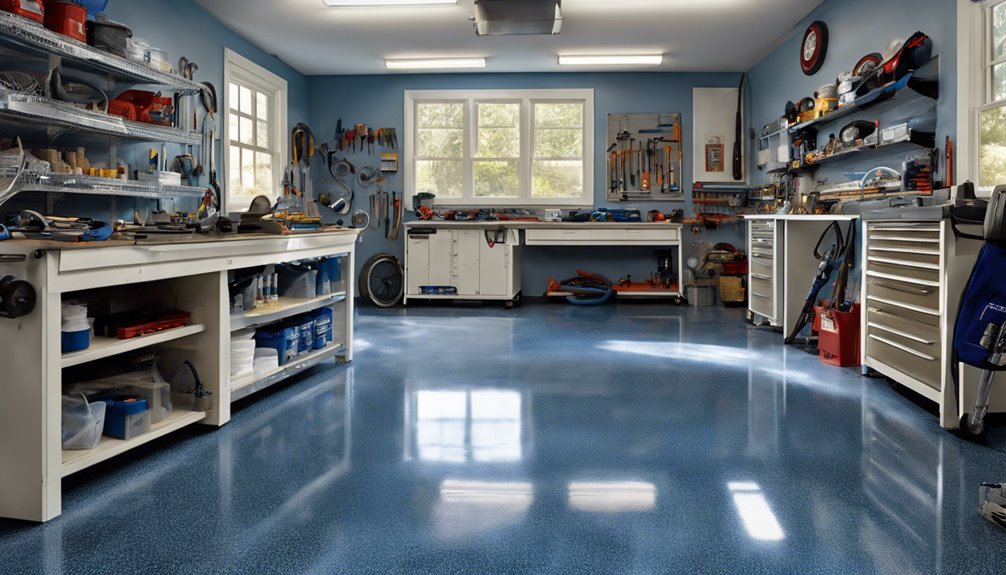
Because epoxy flooring costs can vary considerably based on your location, it's crucial to research regional pricing before making a decision. Factors like local demand and labor costs can greatly influence your overall expense. Here are some points to keep in mind:
- Urban vs. Rural: Urban areas often have higher costs due to demand.
- Seasonal Fluctuations: Prices may rise during peak seasons.
- Local Contractors: Rates can vary based on the availability of skilled labor.
- Material Costs: Different regions might have varying prices for epoxy materials.
Budgeting for Epoxy Flooring
When planning your epoxy flooring project, it's essential to establish a realistic budget that encompasses all potential expenses. Start by researching the cost estimation for materials, labor, and any necessary tools. Consider budgeting strategies like breaking down costs into categories: materials, installation, and any additional features like colors or patterns. Don't forget to account for surface preparation, which can add to your overall expense. You might also want to set aside a contingency fund for unexpected costs. By mapping out your expenses clearly, you'll have the freedom to make informed decisions without overspending. This approach not only keeps your project on track but also guarantees that you're satisfied with the final result, both aesthetically and financially.
Questions fréquemment posées
How Long Does an Epoxy Garage Floor Last?
When you're considering an epoxy garage floor, you'll want to know about its lifespan. Typically, epoxy durability can range from 5 to 10 years, depending on factors like usage and maintenance. Regular upkeep, like cleaning spills and avoiding harsh chemicals, can help extend its life. If you keep up with the maintenance requirements, you can enjoy a beautiful, long-lasting surface that stands up to wear and tear while enhancing your garage's functionality.
Can Epoxy Be Applied Over Existing Flooring?
You might think applying epoxy over existing flooring is like putting a cherry on a sundae—absolutely transformative! Yes, you can do it, but the current flooring needs to be in good condition. Epoxy offers benefits like durability and ease of maintenance, making it a great choice among flooring options. Just guarantee the surface is clean and properly prepared; otherwise, you might not get that flawless finish you're dreaming of!
What Preparation Is Needed Before Epoxy Application?
Before applying epoxy, you need to focus on surface cleaning and moisture testing. Start by thoroughly cleaning the floor to remove any dirt, grease, or debris, ensuring a smooth application. Next, conduct a moisture test to check for any underlying dampness, as this can affect adhesion. If your floor fails the moisture test, it's essential to address the issue before proceeding. Taking these steps will lead to a successful epoxy finish.
Are There Any Health Risks During Installation?
When you're transforming your space, it's easy to overlook health risks, but they're lurking. During epoxy installation, you should consider health precautions like wearing gloves and masks. Poor ventilation can lead to harmful fumes, so guarantee you've got adequate airflow—open windows or use fans. Ignoring these steps might compromise your well-being. Taking these measures not only keeps you safe but also lets you enjoy your project without worry. Freedom comes with responsibility!
How Long Does Epoxy Take to Cure Completely?
When you're considering epoxy for your garage, it's essential to know that the cure time typically ranges from 24 to 72 hours under ideal curing conditions. Temperature and humidity play a significant role in this process. If it's cooler or more humid, you might need to wait longer for the epoxy to fully cure. To guarantee the best results, give it ample time before placing heavy items back in your garage.

